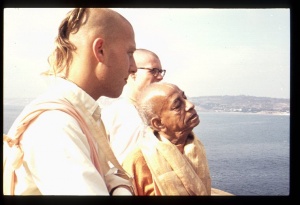SB 10.77.6-7: Difference between revisions
(Vanibot #0018 edit: make synonym terms in Sanskrit italic in SB - Vanisource) |
(Vanibot #0054 edit - transform synonyms into clickable links, which search similar occurrences) |
||
| Line 28: | Line 28: | ||
<div class="synonyms"> | <div class="synonyms"> | ||
''indraprastham'' | ''[//vanipedia.org/wiki/Special:VaniSearch?s=indraprastham&tab=syno_o&ds=1 indraprastham]'' — to Indraprastha, the capital of the Pāṇḍavas; ''[//vanipedia.org/wiki/Special:VaniSearch?s=gataḥ&tab=syno_o&ds=1 gataḥ]'' — gone; ''[//vanipedia.org/wiki/Special:VaniSearch?s=kṛṣṇaḥ&tab=syno_o&ds=1 kṛṣṇaḥ]'' — Lord Kṛṣṇa; ''[//vanipedia.org/wiki/Special:VaniSearch?s=āhūtaḥ&tab=syno_o&ds=1 āhūtaḥ]'' — called; ''[//vanipedia.org/wiki/Special:VaniSearch?s=dharma&tab=syno_o&ds=1 dharma]-[//vanipedia.org/wiki/Special:VaniSearch?s=sūnunā&tab=syno_o&ds=1 sūnunā]'' — by the son of Yamarāja, religion personified (King Yudhiṣṭhira); ''[//vanipedia.org/wiki/Special:VaniSearch?s=rājasūye&tab=syno_o&ds=1 rājasūye]'' — the Rājasūya sacrifice; ''[//vanipedia.org/wiki/Special:VaniSearch?s=atha&tab=syno_o&ds=1 atha]'' — then; ''[//vanipedia.org/wiki/Special:VaniSearch?s=nivṛtte&tab=syno_o&ds=1 nivṛtte]'' — when it was complete; ''[//vanipedia.org/wiki/Special:VaniSearch?s=śiśupāle&tab=syno_o&ds=1 śiśupāle]'' — Śiśupāla; ''[//vanipedia.org/wiki/Special:VaniSearch?s=ca&tab=syno_o&ds=1 ca]'' — and; ''[//vanipedia.org/wiki/Special:VaniSearch?s=saṁsthite&tab=syno_o&ds=1 saṁsthite]'' — when he had been killed; ''[//vanipedia.org/wiki/Special:VaniSearch?s=anujñāpya&tab=syno_o&ds=1 anujñāpya]'' — taking leave; ''[//vanipedia.org/wiki/Special:VaniSearch?s=munīn&tab=syno_o&ds=1 munīn]'' — of the sages; ''[//vanipedia.org/wiki/Special:VaniSearch?s=ca&tab=syno_o&ds=1 ca]'' — and; ''[//vanipedia.org/wiki/Special:VaniSearch?s=sa&tab=syno_o&ds=1 sa]'' — with; ''[//vanipedia.org/wiki/Special:VaniSearch?s=sutām&tab=syno_o&ds=1 sutām]'' — her sons (the Pāṇḍavas); ''[//vanipedia.org/wiki/Special:VaniSearch?s=pṛthām&tab=syno_o&ds=1 pṛthām]'' — of Queen Kuntī; ''[//vanipedia.org/wiki/Special:VaniSearch?s=nimittāni&tab=syno_o&ds=1 nimittāni]'' — bad omens; ''[//vanipedia.org/wiki/Special:VaniSearch?s=ati&tab=syno_o&ds=1 ati]'' — very; ''[//vanipedia.org/wiki/Special:VaniSearch?s=ghorāṇi&tab=syno_o&ds=1 ghorāṇi]'' — terrible; ''[//vanipedia.org/wiki/Special:VaniSearch?s=paśyan&tab=syno_o&ds=1 paśyan]'' — seeing; ''[//vanipedia.org/wiki/Special:VaniSearch?s=dvāravatīm&tab=syno_o&ds=1 dvāravatīm]'' — to Dvārakā; ''[//vanipedia.org/wiki/Special:VaniSearch?s=yayau&tab=syno_o&ds=1 yayau]'' — He went. | ||
</div> | </div> | ||
Latest revision as of 19:57, 17 February 2024

A.C. Bhaktivedanta Swami Prabhupada
Please note: The synonyms, translation and purport of this verse were composed by disciples of Śrīla Prabhupāda
TEXTS 6-7
- indraprasthaṁ gataḥ kṛṣṇa
- āhūto dharma-sūnunā
- rājasūye 'tha nivṛtte
- śiśupāle ca saṁsthite
- kuru-vṛddhān anujñāpya
- munīṁś ca sa-sutāṁ pṛthām
- nimittāny ati-ghorāṇi
- paśyan dvāravatīṁ yayau
SYNONYMS
indraprastham — to Indraprastha, the capital of the Pāṇḍavas; gataḥ — gone; kṛṣṇaḥ — Lord Kṛṣṇa; āhūtaḥ — called; dharma-sūnunā — by the son of Yamarāja, religion personified (King Yudhiṣṭhira); rājasūye — the Rājasūya sacrifice; atha — then; nivṛtte — when it was complete; śiśupāle — Śiśupāla; ca — and; saṁsthite — when he had been killed; anujñāpya — taking leave; munīn — of the sages; ca — and; sa — with; sutām — her sons (the Pāṇḍavas); pṛthām — of Queen Kuntī; nimittāni — bad omens; ati — very; ghorāṇi — terrible; paśyan — seeing; dvāravatīm — to Dvārakā; yayau — He went.
Translation and purport composed by disciples of Śrīla Prabhupāda
TRANSLATION
Invited by Yudhiṣṭhira, the son of Dharma, Lord Kṛṣṇa had gone to Indraprastha. Now that the Rājasūya sacrifice had been completed and Śiśupāla killed, the Lord began to see inauspicious omens. So He took leave of the Kuru elders and the great sages, and also of Pṛthā and her sons, and returned to Dvārakā.